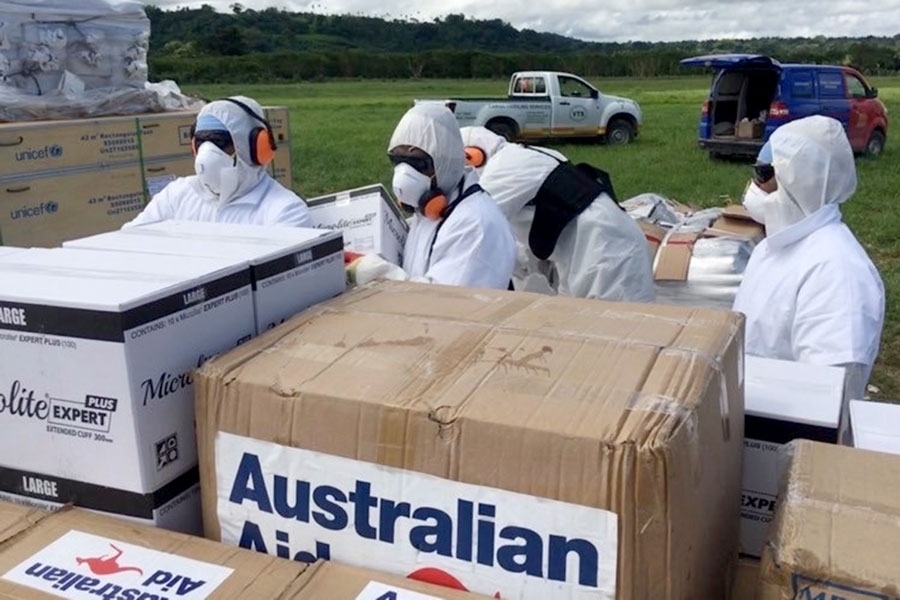Covid-19 has only catalysed the growing geopolitical interest in the Pacific Islands. Donors have been tripping over each other to prepare for an outbreak of the virus. But, at the same time, this has only exacerbated fundamental cleavages in the delivery of aid to the region.
The Pacific has always had a messy web of donor footprints. Australia and New Zealand have been a constant presence. Alongside this, there is a split between the islands that recognise China versus those that recognise Taiwan.
On top of this, colonial relationships and ongoing Compacts of Free Association agreements mean that the support of some big powers looms large in parts of the region, while being entirely absent in others. And more recently, new players such as the European Union have also stepped into the ring.
The fact that the Pacific’s development indicators continue to rank well behind those of Sub-Saharan Africa has helped it avoid the intense politicisation of aid we have seen elsewhere.
But if current trends continue, the Pacific is on track for a collision between its fundamental development needs and the rapidly evolving state of its geopolitical relationships. In just the past few years alone, China has overtaken the United States to become the third-largest donor in the region.
The great risk in all this is that whatever the Pacific needs, it is unlikely to actually receive. Purely donor-driven approaches rarely deliver what a recipient needs, especially when it is geopolitics – not development – driving the agenda.
This new-found interest in the region has also created a myriad of different bilateral aid processes for recipient countries to navigate. As a result, public servants are forced to spend their days writing proposal after proposal, rather than actually getting on with delivering them.
Take Tuvalu, where the support of 58 different donor countries makes up more than half of its gross domestic product, but where there are only eight people responsible for managing this aid.
With the fight against climate change now touching every development project in the Pacific, the greatest setback in the push to harmonise this development aid in recent years has arguably been Australia’s decision to withdraw from the Green Climate Fund (GCF).
The GCF was designed to precisely address this problem by streamlining climate finance. No amount of additional bilateral funding from Australia will make up for this reckless decision.
However, China’s approach is equally problematic – not least its proclivity for bilateral support and large concessional loans, over multilateral channels or even cooperative development projects with other donors. It is hard to underestimate the geopolitical kudos that would probably come Beijing’s way from developing countries if it were to channel some of its own funding through the GCF, for example.
Australia, which remains the largest donor to the region by far, has a particular interest in helping forge a more coordinated approach among the Pacific’s donor community. Analyst Allan Behm’s recent suggestion for Australia to convene a donor conference is a good one.
Australia should realise that its own Pacific “step up” will continue to be hamstrung by its lack of a genuine climate policy, its ability to play this kind of role will remain limited.
Most importantly, such an approach should also be driven by the Pacific itself. The Pacific Islands Forum’s existing “Dialogue Partners” group could provide the basis for this, especially if it can find a way to involve Taiwan.
The 2009 Cairns Compact on Strengthening Development Coordination in the Pacific tried to improve things. And the recent establishment of the “Pacific Humanitarian Pathway” at the height of the Covid-19 crisis could provide a renewed opportunity to get this done.
Covid-19 has confirmed that the new-found geopolitical interest in the Pacific shows no signs of abating. But a better way must be found to coordinate the delivery of aid to the region that comes with this. This crisis is an opportunity to do just that.
Dr Hilda Heine is a former president of the Republic of the Marshall Islands. Thom Woodroofe is senior adviser on multilateral affairs to the president of the Asia Society Policy Institute. This article is published in a content partnership with the Asia Society Policy Institute’s Covid New (Ab) Normal initiative
